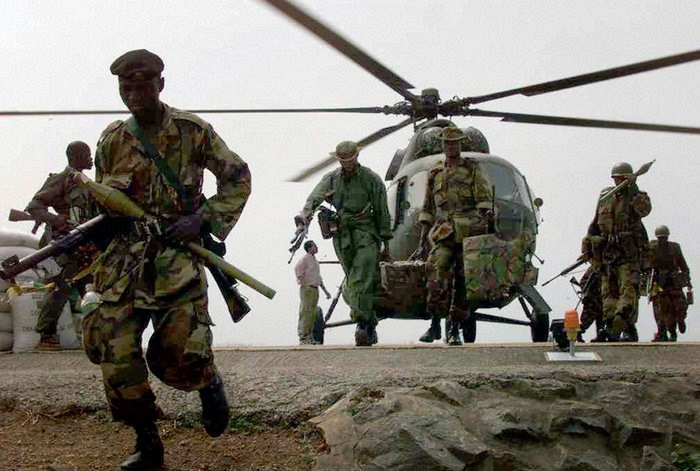- ECOWAS Troops Suspend Gambia Operation
ECOWAS troops halted their march into Gambia Thursday night to give former president Yahya Jammeh, one more last chance to leave Banjul.
Jammeh has up till noon to leave, in the new deadline given by ECOWAS, the West African regional bloc.
If he fails to do so, the troops under Operation Restore Democracy, will continue their march into the capital. There was no resistance by Gambian troops at the border when the West African soldiers entered Thursday.
”Troops in Farafenni refused to fight. They opened border for ECOWAS troops to enter freely. No loss of lives down that end’, a source monitoring the operation said.
Gambia’s new President Adama Barrow took the oath of office on Thursday at Gambia’s embassy in Dakar Senegal, calling for international support from West Africa’s ECOWAS bloc, the African Union and the United Nations.
“This is a day no Gambian will ever forget,” Barrow said after taking the oath, which was administered by the president of Gambia’s bar association.
“Our national flag will now fly high among the most democratic nations of the world.”
The support he canvassed for quickly came in with the United Nations Security Council supporting a resolution backing West Africa’s effort to restore democracy in the small African country.
Thereafter, the regional military force launched an intervention effort.
“We think that up until the last minute there is still a solution through dialogue,” said Marcel de Souza, head of the ECOWAS commission, explaining the decision to suspend the advance to reporters in Dakar late on Thursday.
ECOWAS will send a team led by Guinea’s president, Alpha Conde, and including the presidents of Liberia and Mauritania to Banjul on Friday, de Souza said.
If the mission succeeds, Jammeh will travel to Guinea before choosing a country of exile.
“It’s out of the question that he stays in place. … We propose that he leaves in an honourable manner and with respect,” said de Souza, who added that regional leaders were open to the possibility of an amnesty as part of a deal.
It was unclear what Jammeh’s next move would be. He has so far ignored pressure to step aside and offers of exile.
On Thursday, he still tried to exercise his emasculated power by announcing the dissolution of his cabinet and promised to reconstitute a new one.
In reality, he is now alone, with his government riddled by defections. In the biggest loss yet, Vice President Isatou Njie Saidy, who has held the role since 1997, quit on Wednesday.
Jammeh, in power since a 1994 coup, initially conceded defeat to Barrow following a Dec. 1 election before back-tracking, saying the vote was flawed.
De Souza said a total of 7,000 troops from Senegal, Nigeria, Ghana, Togo and Mali are involved in the operation. Troops had already entered Gambia from the southeast, southwest and north before they were ordered to stop.
The advance will resume at noon (1200 GMT) on Friday if Jammeh still refused to leave, he said. Barrow will return to Gambia once the operation is over.
The U.N. Security Council on Thursday backed ECOWAS’s efforts to ensure Barrow assumes power, and the United States said it supported the intervention.
U.N. Secretary-General Antonio Guterres in a statement pledged “his full support for his (Barrow’s) determination, and ECOWAS’s historic decision, with the unanimous backing of the Security Council, to restore the rule of law in The Gambia so as to honour and respect the will of the Gambian people.”
ECOWAS and the African Union previously said they would recognise Barrow from Thursday, and nations including the United Kingdom and France were quick to congratulate him.
INSIDE GAMBIA
Following Barrow’s swearing in, hundreds of Gambians celebrated in the streets of Banjul, the capital, cautiously at first, and then gradually in larger numbers as they realised the security forces looking on were not going to open fire.
Army chief General Ousman Badjie, who had publicly stood by Jammeh, was seen smiling on the streets wading through a mass of jubilant Banjul residents shouting and dancing.
Cars raced up and down the highway lined with iron-roofed shops in the pro-Barrow Serrekunda district of Banjul, with horns honking and people hanging out the windows.
“The dictator is out,” shouted pharmacist Lamine Jao, 30, as others cheered and whistled in agreement. “It’s just a question of time. We’ll soon flush him out. Believe me.”
During the brief inauguration speech, Barrow asserted his new role as commander and chief of Gambia’s armed services, ordering soldiers to stay calm and remain in their barracks. Those who did not would be considered rebels, he said.
In a statement released late on Thursday, Jammeh announced he was dissolving his government – a 19-member Cabinet, half of whose members had already resigned – and pledged to name a new one “in due course.”
Fearing unrest, thousands of Gambians have fled in recent weeks, the United Nations estimates.
Tour companies, meanwhile, have rushed to evacuate hundreds of European tourists.
Gambia’s long, sandy beaches have made it a prime destination for tourists, but Jammeh, who once vowed to rule for “a billion years,” has earned a reputation for rights abuses and stifling dissent.


 Forex3 weeks ago
Forex3 weeks ago


 Naira2 weeks ago
Naira2 weeks ago
 Billionaire Watch2 weeks ago
Billionaire Watch2 weeks ago




 Naira2 weeks ago
Naira2 weeks ago




 Naira2 weeks ago
Naira2 weeks ago




 Naira4 weeks ago
Naira4 weeks ago


 Naira7 days ago
Naira7 days ago
 Banking Sector4 weeks ago
Banking Sector4 weeks ago





















